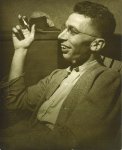- Joined
- Jan 20, 2014
- Messages
- 51,747
- Reaction score
- 14,178
- Gender
- Male
- Political Leaning
- Very Conservative
There is something to be gained from nearly every written work, but some of them are so good they do much to reframe your worldview. This is one of these books. Moral Basis of a Backward Society: Banfield, Edward C.: 9780029015100: Amazon.com: Books ]The Moral Basis of a Backward Society[/url] is an easy to read yet detailed account of a sociological survey conducted in an isolated Italian village, the summary will shock and terrify anyone who is following current political trends.
Edward C Banfield was born in 1916 in Bloomfield, Connecticut. He graduated from University of Connecticut where he studied English and Agrictulture. He become enthralled with the New Deal programs of Franklin Roosevelt and initially worked for several government agencies. He later became convinced many government programs were not effective in helping the poor. in 1957 Banfield and his wife traveled to the village of "Montegrano" (a pseudonym for the village of Chiaromonte) a small village in southern Italy to study the culture of this village. The results caused Banfield to write this book The Moral Basis of a Backward Society. Using the knowledge gained from this trip he would later write a book called The Unheavenly City which explored problems in black neighborhoods in the 70s. He became a supporter of Ronald Reagan and broken windows policing, and has been cited as an influence by Thomas Sowell. He died in 1999.
The book explores a culture of "Amoral Familism" in Montegrano Italy in the late 1950s. Banfield starts with a comparison to a similar isolated rural settlement with a similar population to Montegrano, Saint George Utah. He explains that in Saint George there are multitudes of clubs, the LDS church pours massive amounts of money and food into aid for the needy, Parents are sought out to participate in PTA, sports teams for youth are encouraged, multiple newspapers are circulated, and children are well educated. In Montegrano the situation is very different. A culture exists that is self serving, the residents only care about the immediate short term benefits to themselves and their families. No intermediate institutions exist. There is no trust between the villagers. cheating on wages is routine, cheating on taxes is routine. Despite Italy being formally a democracy at this time, no interests exists in electoral politics, when officials run for election they are elected by promising patronage and immediately dismissed as corrupt. It is a given that officials will take bribes and act corruptly. The village is on a mountain top with farmland surrounding the mountain, there is few big land owners and the land is owned piecemeal by various people, many of whom own several small plots in different locations. This occurs due to a combination of inheritances and dowries. In fact much of the selfish and short term nature of the villagers appears to be related to trying to put together enough land for dowries for their daughters.
Edward C Banfield was born in 1916 in Bloomfield, Connecticut. He graduated from University of Connecticut where he studied English and Agrictulture. He become enthralled with the New Deal programs of Franklin Roosevelt and initially worked for several government agencies. He later became convinced many government programs were not effective in helping the poor. in 1957 Banfield and his wife traveled to the village of "Montegrano" (a pseudonym for the village of Chiaromonte) a small village in southern Italy to study the culture of this village. The results caused Banfield to write this book The Moral Basis of a Backward Society. Using the knowledge gained from this trip he would later write a book called The Unheavenly City which explored problems in black neighborhoods in the 70s. He became a supporter of Ronald Reagan and broken windows policing, and has been cited as an influence by Thomas Sowell. He died in 1999.
The book explores a culture of "Amoral Familism" in Montegrano Italy in the late 1950s. Banfield starts with a comparison to a similar isolated rural settlement with a similar population to Montegrano, Saint George Utah. He explains that in Saint George there are multitudes of clubs, the LDS church pours massive amounts of money and food into aid for the needy, Parents are sought out to participate in PTA, sports teams for youth are encouraged, multiple newspapers are circulated, and children are well educated. In Montegrano the situation is very different. A culture exists that is self serving, the residents only care about the immediate short term benefits to themselves and their families. No intermediate institutions exist. There is no trust between the villagers. cheating on wages is routine, cheating on taxes is routine. Despite Italy being formally a democracy at this time, no interests exists in electoral politics, when officials run for election they are elected by promising patronage and immediately dismissed as corrupt. It is a given that officials will take bribes and act corruptly. The village is on a mountain top with farmland surrounding the mountain, there is few big land owners and the land is owned piecemeal by various people, many of whom own several small plots in different locations. This occurs due to a combination of inheritances and dowries. In fact much of the selfish and short term nature of the villagers appears to be related to trying to put together enough land for dowries for their daughters.

